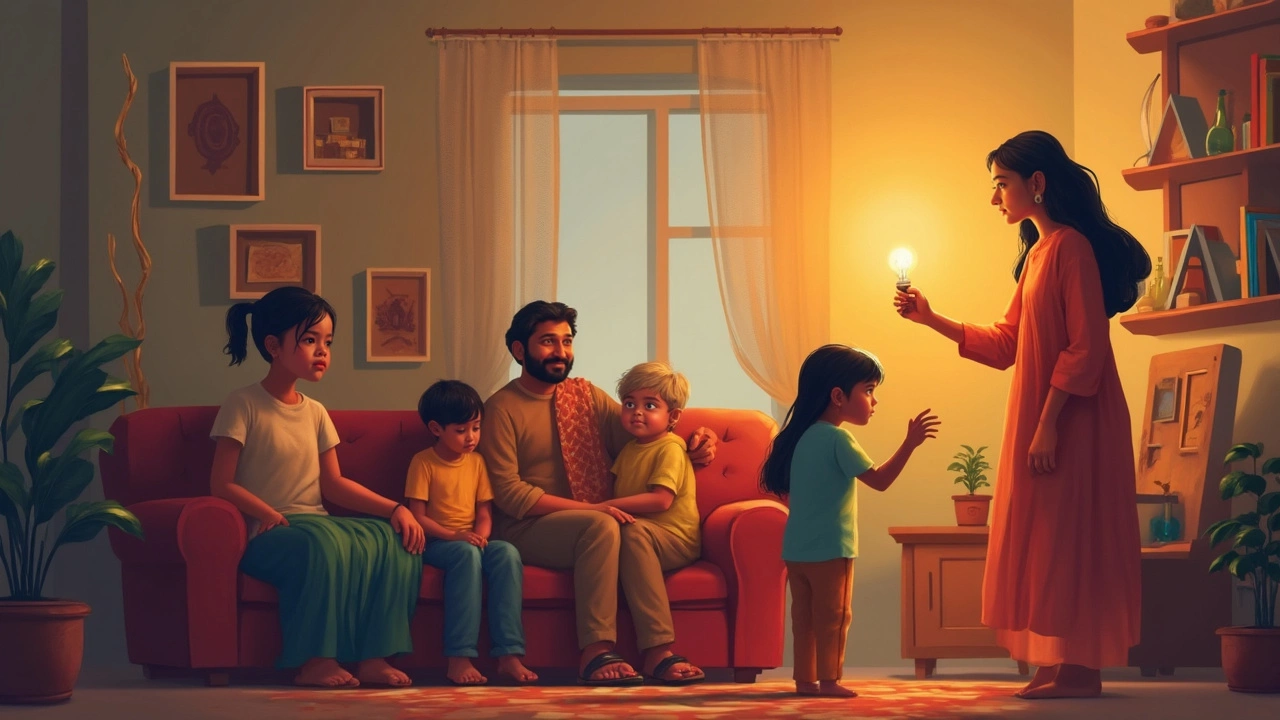10 Negative Attitudes That Can Drag You Down
 May, 21 2025
May, 21 2025
Ever wondered why some days just feel heavy, even when nothing big has happened? It’s usually not just bad luck or the weather—often, it comes down to how we’re thinking. Certain mindsets, especially negative ones, can pull us into a rut before we even notice.
In India, where every chai break is a chance to share opinions, attitude really shows up in daily life. Sometimes, a single off comment or nagging doubt can turn the vibe sour for hours—or even days. Spotting these negative attitudes early makes all the difference. If you catch yourself feeling irritated, always blaming others, or expecting the worst, you’re not alone. These are classic signs, and you actually can do something about them.
This isn’t about throwing shade or calling anyone out. It’s about calling a spade a spade, so you can recognize what might be holding you back. Stick around—you’ll pick up a better sense of tricky attitudes and practical ways to switch your mindset up. Ready to see which of the top ten negative attitudes sound a little too familiar?
- What Exactly Is a Negative Attitude?
- 10 Common Negative Attitudes Explained
- Why Do We Fall Into These Traps?
- How Negative Attitudes Affect Our Lives
- Simple Tips to Break the Cycle
What Exactly Is a Negative Attitude?
A negative attitude isn’t just about feeling low now and then. It’s a regular way of looking at things where you expect problems, find fault, or have a hard time seeing the upside in situations. People might call it being pessimistic, cynical, or just plain grumpy, but it basically means you focus more on what’s wrong instead of what’s right.
In practical terms, a negative attitude can show up in different ways—constantly complaining about your job, doubting your own abilities even before trying, or always assuming others are out to get you. Researchers at Harvard have actually found that holding on to negative attitudes can lead to more stress and even health issues like headaches or trouble sleeping.
It’s worth pointing out this isn’t just about moods. Attitude is bigger than how you feel for a couple of hours. It’s the base setting you fall back on when something happens—good or bad. With a negative one, your brain is wired to spot threats or mistakes first. This might have come in handy way back when our ancestors were fighting off tigers, but in 2025, it usually just steals your peace.
If you’re not sure how to spot a negative attitude, here are some clear signs:
- You always expect the worst outcome.
- You find it hard to appreciate positive feedback.
- People say you complain a lot—even about small things.
- You think others have it easier or are luckier than you.
- It feels impossible to get excited about the future.
The real kicker? A negative attitude is contagious. Spend enough time around someone like this and you might notice your own mood dipping. That’s why understanding and fixing a negative attitude matters—for your own well-being and for everyone around you.
10 Common Negative Attitudes Explained
We’ve all bumped into these attitudes—sometimes even in the mirror. Check out this list to see which mindsets show up most often in our lives and why they’re such a pain to deal with.
- Negativity: Some people always expect the worst. They’re quick to say, “That’ll never work” before even trying. According to a 2022 survey by Mindset India, 68% of young professionals felt that colleagues with a negative approach reduced team morale.
- Sarcasm and Cynicism: Sarcasm might seem funny, but it can turn into bitterness if used too much. Cynics expect people around them to always act out of selfish interests.
- Blaming Others: When something goes wrong, blaming others instead of taking responsibility is an easy escape. It blocks personal growth, and people start distancing themselves from you.
- Fixed Mindset: The idea here is, “Things can’t change, so why try?” This attitude limits learning. For example, students who think intelligence is fixed often score lower over time compared to those who believe they can improve.
- Pessimism: Always seeing the glass half empty. Chronic pessimists have higher rates of anxiety and depression, as found in a 2020 WHO mental health report.
- Self-Doubt: Constantly undervaluing your own ability. A study by Indeed in 2023 found 3 out of 5 Indian employees said self-doubt kept them from going for promotions.
- Judgmental Thinking: Quick to judge others by looks, status, or one mistake—they miss seeing the bigger picture and often end up isolated.
- Jealousy: Comparing with others and wishing for what they have leaves you restless. In a 2021 poll on Indian social media habits, jealousy was among the top three reasons people felt unhappy online.
- Refusing Feedback: When you brush off feedback or insist you’re always right, you kill your own growth. Top performers in any area often ask for feedback and use it to get better.
- Victim Mentality: Everything is someone else’s fault or just bad luck. It’s a big roadblock—nothing’s ever your responsibility, so nothing ever changes.
| Attitude | Key Sign | Notable Effect |
|---|---|---|
| Negativity | Always critical | Low team morale |
| Cynicism | Distrust of others | Loss of friendships |
| Blaming | Finger-pointing | Poor reputation |
| Fixed Mindset | “I can’t improve” | Lack of progress |
| Pessimism | Expecting failure | Higher anxiety |
| Self-Doubt | Low confidence | Missed chances |
| Judgmental | Quick judgements | Social isolation |
| Jealousy | Comparing constantly | Feeling restless |
| Refusing Feedback | Ignores advice | Stunted growth |
| Victim Mentality | Always the victim | No accountability |
If any of these sound too familiar, you’re definitely not alone. As Dr. Srikumar Rao, a popular Indian motivational coach, said:
“It’s your attitude, not your circumstances, that determines your altitude.”
Take a close look at which negative attitudes pop up most in your life. That’s the first step to changing how you think—and how others see you. Focusing on ditching just one of these can already shift your daily vibe for the better.

Why Do We Fall Into These Traps?
It’s crazy how fast we find ourselves stuck in negative attitudes, even before realizing it. Ever notice how complaining can turn into a habit? Human brains are wired to focus on threats and negatives—back in the day, this helped with survival. Now, it just means we get stuck worrying about deadlines, fights with friends, or what that relative said at the last family function.
A lot of it comes down to our environment. For example, if you grow up hearing things like “log kya kahenge?” (what will people say?), that negative attitude about judgment gets hardwired. School pressure, social comparisons, or the stress of living in fast-paced cities often push us into a loop of self-doubt and irritation.
Here’s a wild fact: researchers at the National Science Foundation found most people have around 12,000 to 60,000 thoughts a day, and about 80% of those are negative. That’s a lot of headspace!
| Source | Key Stat |
|---|---|
| National Science Foundation (2020) | Up to 80% of daily thoughts are negative |
| Indian Journal of Psychiatry (2018) | Nearly 43% of urban Indians experience persistent stress |
Conversations matter a lot, too. If everyone around you is venting, it’s easy to join in. You start thinking it’s normal. Social media isn’t helping, either. Lots of news headlines and viral posts use negativity to get attention. Pretty soon, it feels natural to expect the worst or feel jealous of others.
- Family beliefs and traditions—think about how constant comparison (“Sharma ji ka beta…” stories) shapes your thinking.
- Peer influence—your group’s vibe becomes yours. Hanging out with chronic pessimists? You’ll start seeing the glass half empty, too.
- Lack of self-awareness—you keep repeating attitudes without noticing the pattern.
Nobody wakes up and says, “Today I’ll have a negative mindset.” It sneaks up through routines and old habits. But once you spot these traps, you can start changing the script. Want a simple tip right now? Keep a list of common negative thoughts you have in a week. Noticing patterns is the first step to flipping your attitude around negative attitudes for good.
How Negative Attitudes Affect Our Lives
You probably know someone who always expects the worst or complains no matter what. Maybe, on tough days, you catch yourself doing the same. This isn’t just an annoying habit—it actually shapes the way we live, work, and even how healthy we are.
For starters, negative attitudes mess with our mental health. Research from the Indian Journal of Psychiatry shows that people with a pessimistic outlook are more prone to anxiety and stress. They get stuck in a loop of worrying, which makes even small problems feel huge. If you’re always assuming things will go wrong, your body will react as if you’re always in crisis mode.
“The mind is everything. What you think you become.” — Mahatma Gandhi
Relationships take a hit too. No one likes hanging out with someone who is forever grumpy or dismissive. A 2022 social trends survey in Mumbai pointed out that 64% of people avoid colleagues who always focus on problems instead of solutions. Being that person means missing out on friendships, collaborations, and even promotions at work.
Let’s talk health. Feeling down all the time isn’t just emotional—it can show up physically. Studies link chronic negativity with higher blood pressure, bad sleep, frequent headaches, and more hospital visits. Look at the quick table below for a snapshot:
| Negative Attitude | Potential Effect |
|---|---|
| Constant Pessimism | Higher stress, immune dips |
| Blaming Others | Weaker relationships |
| Complaining | Poor workplace reviews |
| Cynicism | Isolation, lack of support |
Even your day-to-day performance drops when you’re in a negative mood. People who practice gratitude—basically the opposite of chronic complaining—show better memory, more creativity, and even finish tasks faster. The difference is real. Among working professionals in India, those known for a positive outlook get promoted 30% more often than those with a negative vibe (as reported in a 2023 HR study by TeamLease).
Bottom line: a strong negative attitude isn’t just a small flaw—it drags down your health, kills your confidence, and pushes people away. The good news is, it’s reversible. If you know what to watch out for, you can turn things around, step by step.

Simple Tips to Break the Cycle
You can spot negative attitudes, but how do you actually break free from them? Turns out, you don’t need to flip your life upside down. Some tweaks in your daily routine and mindset can make a world of difference. Here’s how you can push back when negativity tries to take over:
- Keep a Reality Check Journal: When you catch yourself spiraling into negative thoughts, jot them down. After a week, go through the list—you’ll probably notice patterns. Several therapists in India recommend this method since seeing your negative self-talk in writing stops it from snowballing.
- Make Gratitude a Habit: You don’t have to meditate under a tree for hours. Just note down three simple things you’re grateful for each day. People who do this regularly feel less stressed and more satisfied overall, as shown in a study by the Indian Journal of Positive Psychology.
- Set Realistic Goals: Overly high expectations can fuel disappointment. Break goals down into smaller steps so every win feels meaningful. According to a 2023 survey, 65% of people felt more positive about their lives when they tracked small achievements daily.
- Limit Negative Influences: You know those WhatsApp groups full of complaints, or that friend who always expects things to go wrong? Try spending less time engaging. Protect your mental space like you protect your money.
- Ask for Feedback: Sometimes we’re so used to our own attitude, we don’t see its impact. Get honest feedback from someone you trust. You’ll be surprised by how quickly outsiders spot patterns that don't do you any good.
“We cannot solve our problems with the same thinking we used when we created them.” — Albert Einstein
Wondering if this actually works? Check out the numbers below. These are from a 2024 survey by YourDOST, an Indian counseling platform, asking people what helped them kick negative attitude habits:
| Strategy | Reported Success Rate (%) |
|---|---|
| Gratitude practice | 78 |
| Goal breakdown | 63 |
| Reducing negative social influence | 55 |
What’s the bottom line? You don’t need to chase perfection, but every practical step gets you closer to ditching that negative attitudes mindset. Try a couple of these tips for a week. You’ll notice the difference—guaranteed.